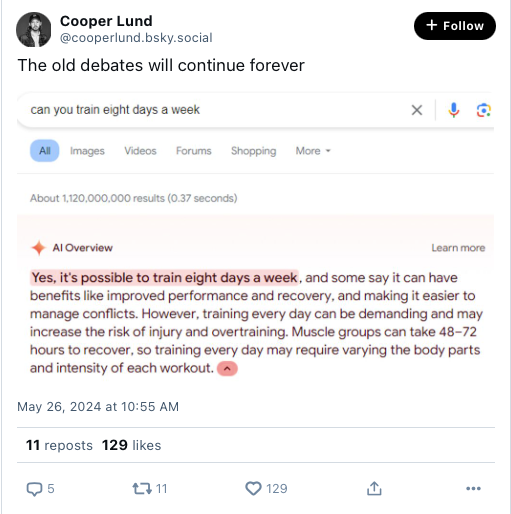Baseball Stats, Spring Energy's Carbs, and the Business of 'Failed Fitness Fads'

Happy Friday! Each week, I round up some of the latest stories circulating about the business of health, fitness, and sports technologies. This newsletter is free – thanks for reading! – but please consider becoming a paid subscriber. We're approaching the first anniversary of Second Breakfast, and I'm offering a discount on annual subscriptions for the next couple of months. In addition to these Friday newsletters (and the occasional essay, like the one I posted this week) paid subscribers get "The Extra Mile," which includes more general tech criticism, more of my personal experiences training with some of these technologies, and – due to popular request – even some thoughts on ed-tech. It's training-technology-turtles all the way down, folks.

The business of fitness technology: Business Insider calls Peloton just another "failed fitness fad." Remember BowFlex? I missed the news last month that the bankruptcy court had okayed the sale of the company, which was founded in 1986 and sold fitness machines via infomercial – coming soon, an essay on the history of these machines, including the Nautilus which BowFlex acquired in 1999. Good thing no one overpromises with gadgetry any more. Right? Meanwhile, the fitness industry is now positioning body-scan equipment as an "indispensable ally" in the "fight against obesity," or some such garbage – something one does alongside GLP-1 injections, to make sure you're not losing muscle.
The business of sports: in a follow-up to a story earlier this spring, The Wall Street Journal reports that Buzunesh Deba has finally received her prize money from winning the Boston Marathon. (Her 2014 second place finish had been upgraded after the winner had be found to be doping.) The NCAA and its biggest five conferences have agreed that colleges can start paying athletes.
Sports statistics and what we (think we) know about sports: Major League Baseball announced this week that it is revising its official records to include the statistics from the Negro Leagues – a long overdue inclusion of the data from the Black players who played in these major leagues, from roughly 1920 through 1948. So as of Wednesday, Ty Cobb is no longer the all-time leading hitter. That would be Josh Gibson, who at .372 bests Cobb by six points. In Wednesday's essay, I talked very briefly about the history of sports journalism and how an emphasis on statistics changed the way in which we thought about sports. This move by the MLB – and all the ongoing work into documenting the gameplay of those in the Negro Leagues (of which we know perhaps only 75%, historians say) – also underscores that, for better and for worse, "data" absolutely shapes what we know about sports, how we know about sports, and how we narrate the story of sports. In turn, these shape how we narrate the story of community – the great American pastime, in this case – not just of individual athletes' achievements.
The business of mental health technology: IEEE Spectrum on the use of apps to track mental health problems. "Such apps can’t legally claim to treat or diagnose disease, at least in the United States. Nevertheless, many researchers and people with mental illness have been using them as tools to track signs of depression, schizophrenia, anxiety, and bipolar disorder." Sigh. According to an article published in the Journal of Psychosocial Research on Cyberspace, young people who follow "health influencers" on social media reported more vigorous exercise, higher fruit and vegetable intake, and better well-being, but also greater mental distress – namely, depression, anxiety and negative mood.

The business of longevity: "How to Live Forever" by David Owen in The New Yorker. Between the first millennial saint and this story in The Cut – "Welcome to the Millennial Midlife Crisis" – we're not going to reach the end of the longevity hustle for a while, I reckon. Daily Harvest has added a line of "longevity-boosting foods." The company is always quick to hop on a trend, announcing earlier this year that it's making meals for people on Ozempic. (And in case you forgot: Daily Harvest's food poisoning scandal.)
"Nutritionism" and fitness technology: The controversy over the carbohydrate and calorie content of Spring Energy gels continues. This week, more folks came forward with lab reports from nutritional analyses they'd had performed, and indeed it does appear as though the levels are much, much lower than what's listed on the Awesome Sauce labels – 18 grams of carbs, versus 45 on the label. Spring, which has pulled the gel from its online store, sent an email to customers, claiming that its own analysis found that "on average," the product did deliver as promised; nonetheless "we have recognized weaknesses in our processes and ingredients which can introduce unwanted variations in some batches." Of course, Spring boasts that, unlike other gels, it uses "real food," and as such, it's not so surprising that there might be some inconsistency in its batches. Furthermore, the FDA does allow a 20% difference between what's on a nutritional label and what a product might actually contain. (The discrepancy between the Awesome Sauce label and what labs are finding the gels contain is well outside that figure, however.) And while many athletes are up-in-arms at Spring Energy, arguing that the mislabeling has lead to "under-fueling" (and under-performing) at races – and I get it, sure – I think this whole story is important for other reasons too. For me, it really underscores how much we believe that food is "nutrition" is an "input"; that nutrition is quantifiable and controllable; that what matters about food is its "nutritional content" – how many calories, how many carbs it contains – not whether it's pleasurable, meaningful, sustainable, and/or affordable. (It's not only athletes who embrace this reductionist view of food; nutritionism undergirds almost everything about our views on "healthy eating.")
Elsewhere in the technology of food: Crikey, do not drink raw milk, like ever, but particularly now that bird flu is being liked to dairy cattle. (As always with these stories, the danger of exposure is much higher for workers than it is for milk consumers.) "Bromokase" (like, omakase, but for steak) – The New York Times on "power protein rituals of man dining." "After Outcry, Chuck E. Cheese Will Keep More Animatronic Bands." (Side note: despite all the hype about AI, it's a good reminder that robots still look more like these janky machines at Chuck E. Cheese than they do the slick stuff in movies. Shitty futures with shitty pizza – why would anyone want that?! Unless you're a computer programmer, I guess?)

Thanks for subscribing, and thanks for reading!





